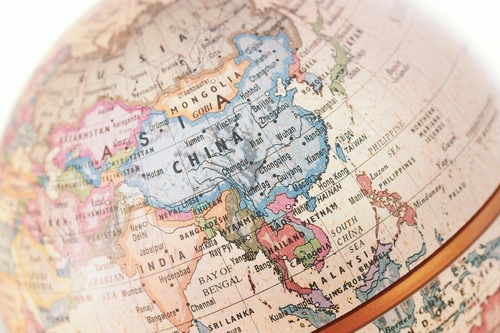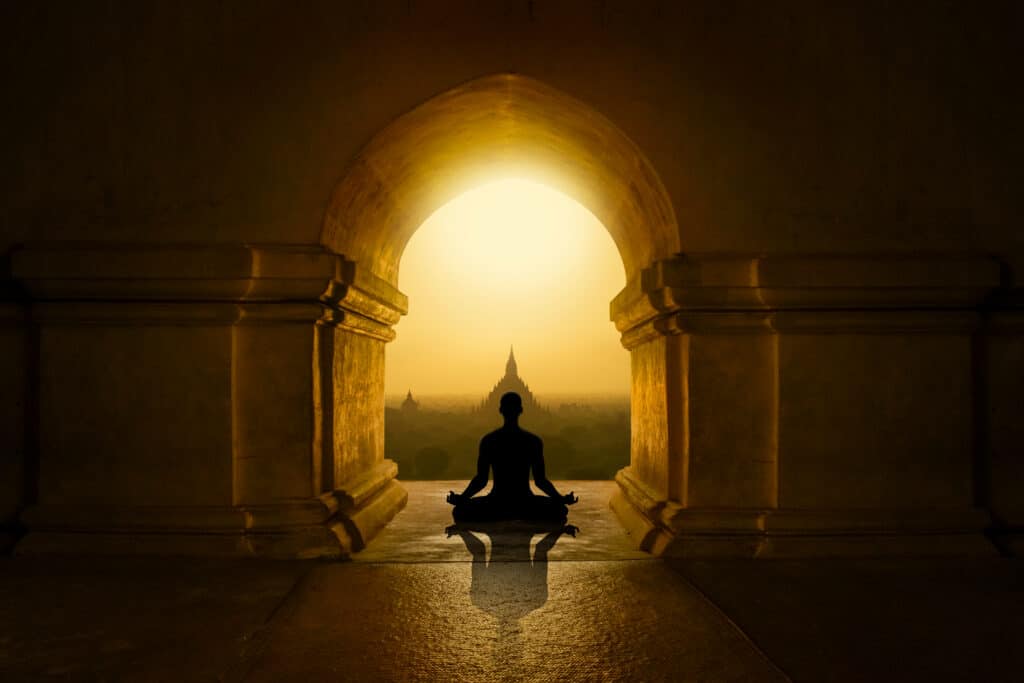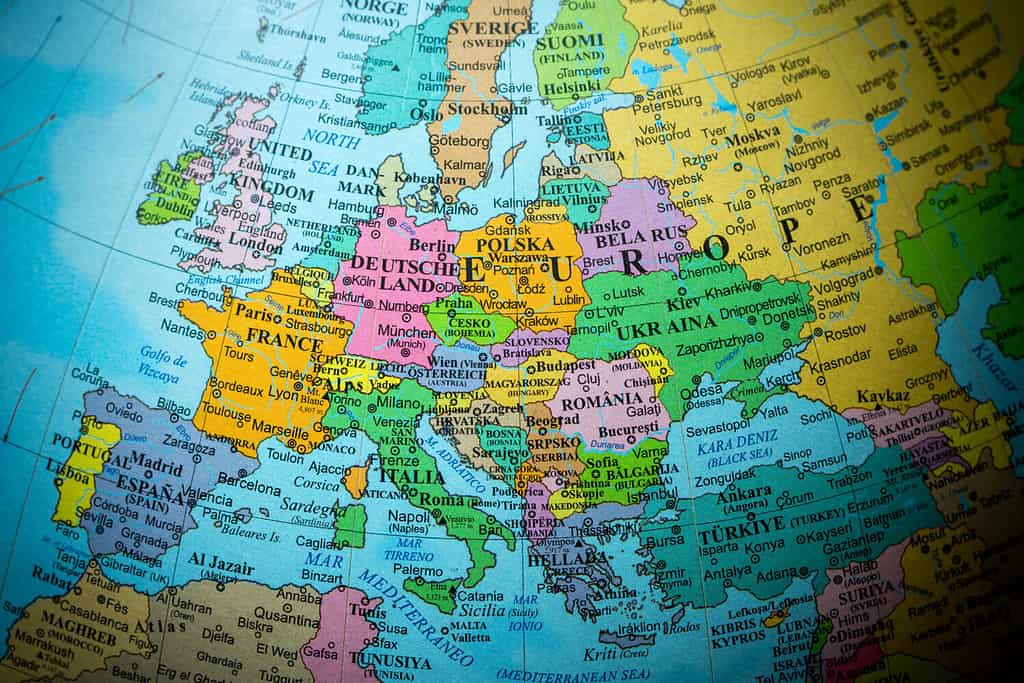Originally, the terms Western and Eastern Worlds were used as descriptive directions before Europeans realized the Americas existed. This evolved into political and cultural concepts that still exist today. As globalization continues, the cultural spheres known as the Eastern and Western Worlds continue to co-mingle. The lines are blurring, though the distinction still exists. When it comes to the Eastern vs Western Worlds, what are the differences?
What Is the Eastern World?

The Eastern World refers to large swaths of Asia.
©Anson_shutterstock/Shutterstock.com
The Eastern World refers to the cultural generalizations that originate from Asia. The countries usually lumped into the concept of an Eastern World are North Korea, South Korea, Japan, China, Hong Kong, Singapore, and some countries in Southeast Asia. One common association with the Eastern World is the use of character or Brahmic scripts instead of the Cyrillic or Roman alphabets.
When generalizing the concept of an Eastern World, emphasis is placed on an individual’s obligation to society and their family. Maintaining harmony between all groups in a collective is prized.
Interconnectedness and communal understanding are highly valued. This leads to a dismissal of individual wants in favor of determinations based on what’s best for the group.
There is also an emphasis on hierarchy with elders commanding more respect by default. Workplace dynamics between a boss and a subordinate dictate that the wants of leadership should be adhered to without a challenge. Social classes are more divided with little mobility as people are expected to fit hierarchical societal niches.
What Are Eastern Religions?

Eastern religions include Buddhism, Hinduism, Taoism, and Confucianism.
©Teo Tarras/Shutterstock.com
Religions that are considered Eastern include but aren’t limited to Buddhism, Hinduism, Taoism, and Confucianism. However, this list is not exhaustive.
These religions tend to be polytheistic with different gods representing different aspects of the universe. However, not all Eastern religions have multiple gods or any god. Others are based on the utilization of a philosophical framework.
The stereotype of an Eastern religion is focused on inward understanding as a means to reduce individual suffering. The idea is to see the self as a part of a greater whole so that individualism doesn’t hinder a better relationship with the world as a whole.
What Is the Western World?

The Western World refers to areas influenced by the cultures of Western Europe.
©Victor Maschek/Shutterstock.com
The Western World is built off the cultural generalizations developed in Western Europe via the Greco-Roman paradigm. This also includes most of the Americas and Australia. However, the idea of a Western country is malleable and shifts depending on the political and cultural climate of a region at any given time.
In the West, an emphasis is placed on individual freedoms and achievements. Autonomy, personal opinions, and independence are valued character traits. Knowing is driven by narrowed observation through data, and good decision-making is that which isn’t based on anecdotal feelings.
Generational differences are not honored in the Western World simply because someone is older. Rather, respect is earned throughout a lifetime and isn’t a guarantee by default.
While there is a loose social class structure in place, mobility between the classes is common. This is rooted in the idea that every person has the same potential even if they don’t have the same clout.
What Are Western Religions?

The most influential Western religion is Christianity.
©iStock.com/unomat
Christianity is a major Western World religion with Roman Catholicism and Protestantism taking the reigns. Judaism and Islam, to a lesser extent, are also considered Western religions though many Islamic countries are not Westernized. Accepted secularism is also a characteristic of the West as individuals are granted the right to not believe in a god if they choose.
What makes a religion stereotypically Western is the belief in one singular god. The idea portrayed in Western religions is that there is a supreme being that deserves reference through the controlled execution of the human experience. It’s the responsibility of an individual to live their life according to strict codes to please one supernatural creator.
Why Isn’t Russia, the Middle East, or Africa Considered the West?
Russia, the Middle East, and Africa are some of the regions that do not fit into the Eastern vs Western World distinction. There are other smaller regions of the world as well that do not neatly fit into one of these two categories.
Russia does not want to be considered a Western country because its culture does not represent stereotypical Western ideals. Its religion is Orthodox which is a form of Christianity that’s different than Roman Catholicism and resultant Protestantism.
Russia was never a part of the Roman Empire, so it lacks the same ancient influences that today seep into the concept of a Western country. Instead, it was informed more by the Byzantine Empire and other empires with different ways of life than the Romans.
The Middle East is not considered part of the Western World mostly because of its emphasis on religion in government. This divergence from Europe took place during the Enlightenment and into modernization. Today, the Middle East is dominated by cultures that value monotheistic authoritarianism instead of the more chaotic individualism in the Western World.
Most of Africa is not considered part of the Western World because of its unique mosaic of cultures. North Africans are much different than Sub-Saharan Africans, and Sub-Saharan Africans are very diverse.
All over Africa, there are many religions, languages, and ways of life represented that cannot be blanketed with one succinct label. Any attempt to do so will result in erroneous generalizations that do not apply to huge swaths of the continent’s population as the continent is not united under one cultural construct.
Summary of the Eastern vs Western Word Differences
| Topic of Comparison | Eastern Worldview | Western Worldview |
|---|---|---|
| Personal Responsibility | To the Group or Collective | To the Autonomous Self |
| Class Dynamics | Set Social Class Hierarchy | Mobility and Equality |
| Generational Relationships | Elders Command Respect | Elders Have to Earn Respect |
| Written Scripts | Character or Brahmic | Roman or Cyrillic |
| Religion | Philosophical, Perhaps Polytheistic | Monotheistic, Individualistic |
The photo featured at the top of this post is © Hase-Hoch-2/ via Getty Images
Thank you for reading! Have some feedback for us? Contact the AZ Animals editorial team.







